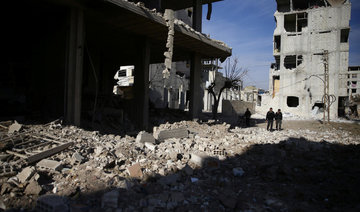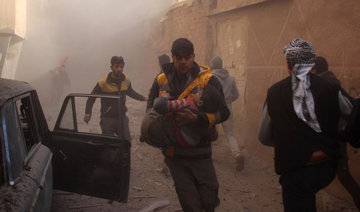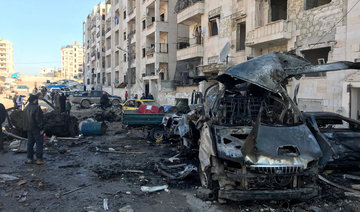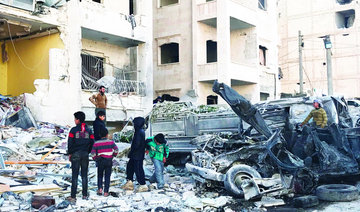BEIRUT: Daesh has been roundly defeated across much of Syria — which made it all the more surprising when it announced an official comeback in the country’s northwest last week.
Syrian regime troops are currently waging a fierce assault against other terrorists and rebels in Idlib province, and in the chaos, Daesh appears to have gained a foothold.
On January 10, Daesh media channels began claiming hit-and-run attacks against Syrian government forces in Idlib, from which the group was ousted in 2014.
Two days later, Daesh officially declared Idlib one of its Islamic “governorates” and has published news of raids against Syrian troops there with increasing pace every day.
Most notably, the organization claims to have killed around two dozen soldiers and taken nearly 20 hostage from an area near the key Abu Duhur military airport in Idlib.
“There are probably hundreds, maybe over 1,000 (Daesh fighters) at most. A number of Daesh guys who fled territory elsewhere made it to this enclave via smuggling,” said Aymenn Al-Tamimi, an academic and expert on the group.
Tamimi told AFP the new Idlib presence was an “extension” of Daesh’s small but established bastion in neighboring Hama province.
More than four years ago, Daesh operated an Islamic “governorate” in Idlib, but it was kicked out of the province in early 2014 by Islamist fighters and allied rebels.
Those fighters went on to oust the regime from the province too, as Daesh extended its Islamic “caliphate” across swathes of Iraq and Syria — but not Idlib.
In Syria, Daesh has since lost almost all that territory to Turkey-backed rebels, US-backed forces, or Syrian army troops.
In December, it made a brief incursion into Idlib for the first time since 2014, but last week’s announcement could signal something more.
So far, it seems Daesh’s territorial grip on Idlib remains limited, with the Syrian Observatory for Human Rights saying it only holds about five villages there.
The Britain-based monitor challenged Daesh’s claims of kidnapping government forces, saying most of the 31 troops captured during the past week in Idlib were held by rival terrorists.
But six were unaccounted for, and Observatory head Rami Abdel Rahman said it was possible, though not confirmed, Daesh was holding them.
“They came out of nowhere, but Daesh was long suspected to have sleeper cells in Idlib,” said Hassan Hassan, a senior fellow at the Tahrir Institute for Middle East Policy.
“I doubt Daesh can get significantly bigger in that area, but this is a big moment for it to build influence and revitalize its cells, some of which will probably remain clandestine,” he said.
A key factor in Daesh’s now-public presence in Idlib, analysts agreed, was the ongoing government offensive against rebels dominated by Hayat Tahrir Al-Sham (HTS) in Idlib.
HTS is led by Al-Qaeda’s one-time franchise in Syria and now rules over a vast majority of Idlib, but the regime’s Russian-backed assault has been chipping away at territory there for several weeks.
Daesh could hardly resist stealing the spotlight, Hassan said.
“Idlib is now a big rebel cause. Everyone is trying to gain popular relevance through their role in defending the area,” he told AFP.
“Such moments are perfect for Daesh to make some noise,” and the group “used the publicity around the offensive to play up its role there.”
Nawar Oliver, an analyst at the Turkey-based Omran Center, suspected Daesh was also trying to take advantage of infighting among Idlib’s rival jihadists to poach hard-liners keen on establishing an Islamic entity.
“With this announcement, extremists in other groups will find a place where they belong,” Oliver said.
“Daesh played this right — they’re saying, I set myself up in Idlib, in the right place at the right time,” he told AFP.
Since war broke out in 2011, Syria has been carved up into complex zones of control held by rebels, Kurdish fighters, pro-regime forces, and competing jihadists including Daesh.
For Charlie Winter, a researcher at King’s College London, it remains “too early” to predict whether IS could make a full-scale comeback across Syria.
“It is battered without manpower, resources, weapons, or the networks to do any strategic offensives like they were able to do in 2014, 2015, and first half of 2016,” he told AFP.
Instead, its proclamation of an Idlib presence was an attempt to say, “we’re still here, knocking around, if we have to pull out from one place we’ll set up somewhere else,” Winter said.
“It can’t have propaganda be about nothing.”
Four years and one caliphate later, Daesh claims Idlib comeback
Four years and one caliphate later, Daesh claims Idlib comeback

Israel says it’s moving toward Lebanon ceasefire

- Axios said Israel and Lebanon had agreed to the terms of a deal
- Israel’s security cabinet was expected to approve deal on Tuesday
JERUSALEM/BEIRUT: Israel is moving toward a ceasefire in the war with Hezbollah but there are still issues to address, its government said on Monday, while two senior Lebanese officials voiced guarded optimism of a deal soon even as Israeli strikes pounded Lebanon.
Axios, citing an unnamed senior US official, said Israel and Lebanon had agreed to the terms of a deal, and that Israel’s security cabinet was expected to approve the deal on Tuesday.
Israel’s ambassador to the United Nations, Danny Danon, said of a ceasefire: “We haven’t finalized it yet, but we are moving forward.” Asked for comment, Israeli Prime Minister Benjamin Netanyahu’s office said it had nothing to say about the report.
Hostilities have intensified in parallel with the diplomatic flurry: Over the weekend, Israel carried out powerful airstrikes, one of which killed at least 29 people in central Beirut — while the Iran-backed Hezbollah unleashed one of its biggest rocket salvoes yet on Sunday, firing 250 missiles.
In Beirut, Israeli airstrikes levelled more of the Hezbollah-controlled southern suburbs on Monday, sending clouds of debris billowing over the Lebanese capital.
Efforts to clinch a truce appeared to advance last week when US mediator Amos Hochstein declared significant progress after talks in Beirut before holding meetings in Israel and then returning to Washington.
“We are moving in the direction toward a deal, but there are still some issues to address,” Israeli government spokesperson David Mencer said, without elaborating.
Michael Herzog, the Israeli ambassador in Washington, told Israel’s GLZ radio an agreement was close and “it could happen within days ... We just need to close the last corners,” according to a post on X by GLZ senior anchorman Efi Triger.
In Beirut, Deputy Parliament Speaker Elias Bou Saab said a decisive moment was approaching and expressed cautious optimism. “The balance is slightly tilted toward there being (an agreement), but by a very small degree, because a person like Netanyahu cannot be trusted,” he said in a news conference.
A second senior Lebanese official, speaking on condition of anonymity, said Beirut had not received any new Israeli demands from US mediators, who were describing the atmosphere as positive and saying “things are in progress.”
The official told Reuters a ceasefire could be clinched this week.
The conflict between Israel and Hezbollah spiralled into full-scale war in September when Israel went on the offensive, pounding wide areas of Lebanon with airstrikes and sending troops into the south.
Israel has dealt major blows to Hezbollah, killing its leader Sayyed Hassan Nasrallah and other top commanders and inflicting massive destruction in areas of Lebanon where the group holds sway.
Diplomacy has focused on restoring a ceasefire based on UN Security Council Resolution 1701, which ended a 2006 Hezbollah-Israel war. It requires Hezbollah to pull its fighters back around 30 km (19 miles) from the Israeli border.
ENFORCEMENT
Israeli Foreign Minister Gideon Saar said the test for any agreement would be in the enforcement of two main points.
“The first is preventing Hezbollah from moving southward beyond the Litani (River), and the second, preventing Hezbollah from rebuilding its force and rearming in all of Lebanon,” Saar said in broadcast remarks to the Israeli parliament.
Far-right National Security Minister Itamar Ben-Gvir said Israel must press on with the war until “absolute victory.” Addressing Netanyahu on X, he said “it is not too late to stop this agreement!“
But Agriculture Minister Avi Dichter said Israel should reach an agreement in Lebanon. “If we say ‘no’ to Hezbollah being south of the Litani, we mean it,” he told journalists.
Hezbollah leader Sheikh Naim Qassem said last week that the group had reviewed and given feedback on the US ceasefire proposal, and any truce was now in Israel’s hands.
Branded a terrorist group by the United States, the heavily armed, Shiite Muslim Hezbollah has endorsed Parliament Speaker Nabih Berri of the Shiite Amal movement to negotiate.
Israel says its aim is to secure the return home of tens of thousands of people evacuated from its north due to rocket attacks by Hezbollah, which opened fire in support of Hamas at the start of the Gaza war in October 2023.
Israel’s offensive has forced more than 1 million people from their homes in Lebanon.
Diplomacy has focused on restoring a ceasefire based on UN Security Council Resolution 1701, which ended a 2006 Hezbollah-Israel war. It requires Hezbollah to pull its fighters back around 30 km (19 miles) from the Israeli border, and the regular Lebanese army to deploy into the frontier region.
Egypt says 17 missing after Red Sea tourist boat capsizes

- Governor Amr Hanafi said that some survivors were rescued by an aircraft, while others were transported to safety aboard a warship
CAIRO: Egyptian authorities said 17 people including British nationals and other foreigners were missing after a tourist yacht capsized off the country’s Red Sea coast on Monday, with 28 others rescued.
The vessel, which was carrying 31 tourists of various nationalities and a 14-member crew, sent out a distress call at 5:30 am (0330 GMT), said a statement from Egypt’s Red Sea governorate.
An AFP tally confirmed that tourists involved in the incident include nationals from the UK, China, Finland, Poland and Spain.
The “Sea Story” embarked on Sunday on a multi-day diving trip from Port Ghalib near Marsa Alam in the southeast, and had been due to dock on Friday at the town of Hurghada, 200 kilometers (124 miles) north.
Governor Amr Hanafi said that some survivors were rescued by an aircraft, while others were transported to safety aboard a warship.
“Intensive search operations are underway in coordination with the navy and the armed forces,” Hanafi added in a statement.
Authorities have not confirmed the nationalities of the tourists.
Beijing’s embassy in Egypt said two of its nationals were “in good health” after being “rescued in the cruise ship sinking accident in the Red Sea,” Chinese state media reported.
The Finnish foreign ministry confirmed to AFP that one of its nationals is missing.
Polish foreign ministry spokesman Pawel Wronski said authorities “have information that two of the tourists may have had Polish citizenship.”
“That’s all we know about them. That’s all we can say for now,” he told national news agency PAP.The Red Sea governor’s office did not immediately respond to AFP’s request for comment about the possible cause of the accident.
According to a manager of a diving resort close to the rescue operation, one surviving crew member said they were “hit by a wave in the middle of the night, throwing the vessel on its side.”
Authorities in the Red Sea capital of Hurghada on Sunday shut down marine activities and the city’s port due to “bad weather conditions.”
But winds around Marsa Alam had remained favorable until Sunday night, the diving manager told AFP, before calming again by morning.
By Monday afternoon, it became increasingly “unlikely that the 17 missing would be rescued after 12 hours in the water,” he said, requesting anonymity because he was not authorized to speak to the media.
The Marsa Alam area saw at least two similar boat accidents earlier this year but there were no fatalities.
The Red Sea coast is a major tourist destination in Egypt, a country of 105 million that is in the grip of a serious economic crisis. Nationally, the tourism sector employs two million people and generates more than 10 percent of GDP.
Dozens of dive boats criss-cross between coral reefs and islands off Egypt’s eastern coast every day, where safety regulations are robust but unevenly enforced.
Earlier this month, 30 people were rescued from a sinking dive boat near the Red Sea’s Daedalus reef.
In June, two dozen French tourists were evacuated safely before their boat sank in a similar accident.
Last year, three British tourists died when a fire broke out on their yacht, engulfing it in flames.
Israel says it’s moving toward Lebanon ceasefire

- Israel’s ambassador to the United Nations, Danny Danon, said of a ceasefire: “We haven’t finalized it yet, but we are moving forward”
JERUSALEM/BEIRUT: Israel is moving toward a ceasefire in the war with Hezbollah but there are still issues to address, its government said on Monday, while two senior Lebanese officials voiced guarded optimism of a deal soon even as Israeli strikes pounded Lebanon.
Axios, citing an unnamed senior US official, said Israel and Lebanon had agreed to the terms of a deal, and that Israel’s security cabinet was expected to approve the deal on Tuesday.
Israel’s ambassador to the United Nations, Danny Danon, said of a ceasefire: “We haven’t finalized it yet, but we are moving forward.” Asked for comment, Israeli Prime Minister Benjamin Netanyahu’s office said it had nothing to say about the report.
Hostilities have intensified in parallel with the diplomatic flurry: Over the weekend, Israel carried out powerful airstrikes, one of which killed at least 29 people in central Beirut — while the Iran-backed Hezbollah unleashed one of its biggest rocket salvoes yet on Sunday, firing 250 missiles.
In Beirut, Israeli airstrikes levelled more of the Hezbollah-controlled southern suburbs on Monday, sending clouds of debris billowing over the Lebanese capital.
Efforts to clinch a truce appeared to advance last week when US mediator Amos Hochstein declared significant progress after talks in Beirut before holding meetings in Israel and then returning to Washington.
“We are moving in the direction toward a deal, but there are still some issues to address,” Israeli government spokesperson David Mencer said, without elaborating.
Michael Herzog, the Israeli ambassador in Washington, told Israel’s GLZ radio an agreement was close and “it could happen within days ... We just need to close the last corners,” according to a post on X by GLZ senior anchorman Efi Triger.
In Beirut, Deputy Parliament Speaker Elias Bou Saab said a decisive moment was approaching and expressed cautious optimism. “The balance is slightly tilted toward there being (an agreement), but by a very small degree, because a person like Netanyahu cannot be trusted,” he said in a news conference.
A second senior Lebanese official, speaking on condition of anonymity, said Beirut had not received any new Israeli demands from US mediators, who were describing the atmosphere as positive and saying “things are in progress.”
The official told Reuters a ceasefire could be clinched this week.
The conflict between Israel and Hezbollah spiralled into full-scale war in September when Israel went on the offensive, pounding wide areas of Lebanon with airstrikes and sending troops into the south.
Israel has dealt major blows to Hezbollah, killing its leader Sayyed Hassan Nasrallah and other top commanders and inflicting massive destruction in areas of Lebanon where the group holds sway.
Diplomacy has focused on restoring a ceasefire based on UN Security Council Resolution 1701, which ended a 2006 Hezbollah-Israel war. It requires Hezbollah to pull its fighters back around 30 km (19 miles) from the Israeli border.
ENFORCEMENT
Israeli Foreign Minister Gideon Saar said the test for any agreement would be in the enforcement of two main points.
“The first is preventing Hezbollah from moving southward beyond the Litani (River), and the second, preventing Hezbollah from rebuilding its force and rearming in all of Lebanon,” Saar said in broadcast remarks to the Israeli parliament.
Far-right National Security Minister Itamar Ben-Gvir said Israel must press on with the war until “absolute victory.” Addressing Netanyahu on X, he said “it is not too late to stop this agreement!“
But Agriculture Minister Avi Dichter said Israel should reach an agreement in Lebanon. “If we say ‘no’ to Hezbollah being south of the Litani, we mean it,” he told journalists.
Hezbollah leader Sheikh Naim Qassem said last week that the group had reviewed and given feedback on the US ceasefire proposal, and any truce was now in Israel’s hands.
Branded a terrorist group by the United States, the heavily armed, Shiite Muslim Hezbollah has endorsed Parliament Speaker Nabih Berri of the Shiite Amal movement to negotiate.
Israel says its aim is to secure the return home of tens of thousands of people evacuated from its north due to rocket attacks by Hezbollah, which opened fire in support of Hamas at the start of the Gaza war in October 2023.
Israel’s offensive has forced more than 1 million people from their homes in Lebanon.
Diplomacy has focused on restoring a ceasefire based on UN Security Council Resolution 1701, which ended a 2006 Hezbollah-Israel war. It requires Hezbollah to pull its fighters back around 30 km (19 miles) from the Israeli border, and the regular Lebanese army to deploy into the frontier region.
Arrest Warrant: UK would follow ‘due process’ if Netanyahu were to visit – foreign minister

- ICC issued arrest warrants on Thursday against Israeli PM Benjamin Netanyahu
- Several EU states have said they will meet commitments under the statute if needed
FIUGGI: Britain would follow due process if Benjamin Netanyahu visited the UK, foreign minister David Lammy said on Monday, when asked if London would fulfil the International Criminal Court’s arrest warrant against the Israeli prime minister.
“We are signatories to the Rome Statute, we have always been committed to our obligations under international law and international humanitarian law,” Lammy told reporters at a G7 meeting in Italy.
“Of course, if there were to be such a visit to the UK, there would be a court process and due process would be followed in relation to those issues.”
The ICC issued the warrants on Thursday against Israeli Prime Minister Benjamin Netanyahu, his former defense minister Yoav Gallant, and Hamas leader Ibrahim Al-Masri for alleged crimes against humanity.
Several EU states have said they will meet their commitments under the statute if needed, but Hungarian Prime Minister Viktor Orban has invited Netanyahu to visit his country, assuring him he would face no risks if he did so.
“The states that signed the Rome convention must implement the court’s decision. It’s not optional,” Josep Borrell, the EU’s top diplomat, said during a visit to Cyprus for a workshop of Israeli and Palestinian peace activists.
Those same obligations were also binding on countries aspiring to join the EU, he said.
Turkiye man kills seven before taking his own life

Istanbul: A 33-year-old Turkish man shot dead seven people in Istanbul on Sunday, including his parents, his wife and his 10-year-old son, before taking his own life, the authorities reported on Monday.
The man, who was found dead in his car shortly after the shooting, is also accused of wounding two other family members, one of them seriously, the Istanbul governor’s office said in a statement.
The authorities, who had put the death toll at four on Sunday evening, announced on Monday the discovery near a lake on Istanbul’s European shore of the bodies of the killer’s wife and son, as well as the lifeless body of his mother-in-law.
According to the Small Arms Survey (SAS), a Swiss research program, over 13.2 million firearms are in circulation in Turkiye, most of them illegally, for a population of around 85 million.















